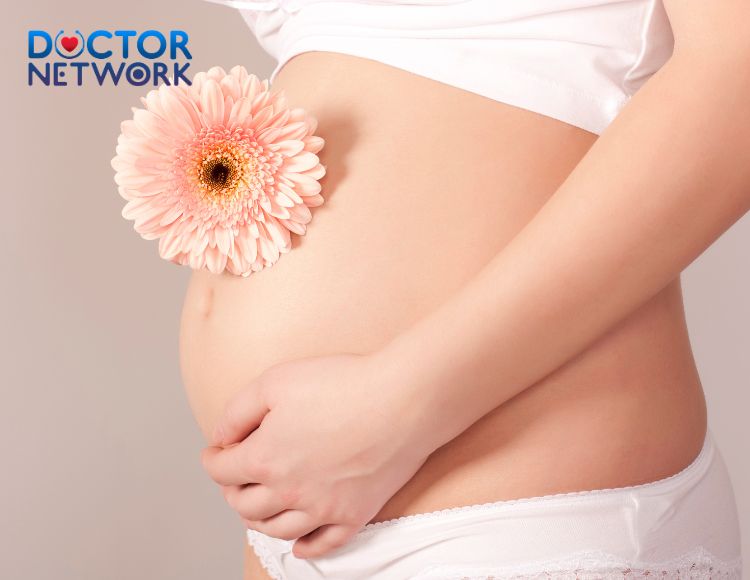Pregnancy is a wonderful journey accompanied by numerous changes in a woman’s body, including hormonal fluctuations. These changes predispose pregnant women to health issues, particularly vaginal infections. So how can “home remedies for vaginal infections during pregnancy” be safely and effectively managed? This article will provide you with essential information and detailed guidance.
Vaginal infections in pregnancy: A concerning issue
Vaginal infections in pregnant women not only cause discomfort such as itching, irritation, abnormal discharge, but also pose risks to the health of both mother and baby.
Untreated infections can lead to complications like preterm birth, intrauterine infections, and affect fetal development.
Common causes and symptoms of vaginal infections in pregnant women
Causes:
Hormonal changes: Increased estrogen levels during pregnancy create favorable conditions for the growth of fungi and bacteria.
Reduced immunity: The weakened immune system in pregnant women makes the body more susceptible to infections.
Improper hygiene: Using strong soaps, vaginal douching, or wearing tight clothing can increase the risk of infection. Symptoms:
Itching, irritation in the genital area: This is the most common symptom of vaginal infections. Itching can be mild to severe, accompanied by a burning sensation.
Abnormal vaginal discharge: Discharge may change in color (white, yellow, green), odor (fishy, foul), and consistency (watery, thick). Pain during urination or intercourse: Infections can cause pain during urination or sexual intercourse.
Home remedies for vaginal infections in pregnant women
- Yogurt – “home remedies for vaginal infections in pregnant women”:
Sugar-free yogurt containing probiotic bacteria helps balance vaginal flora and prevent the growth of disease-causing fungi and bacteria. You can consume yogurt daily or use a tampon soaked in yogurt inserted into the vagina for about 2 hours.

“Home Remedies for Vaginal Infections During Pregnancy” – Sugar-free yogurt contains many probiotic bacteria that help balance the vaginal microflora
- Garlic – “home remedies for vaginal infections in pregnant women”:
Garlic has strong antibacterial and antifungal properties. You can eat raw garlic or incorporate it into your daily meals. Alternatively, crush garlic, wrap it in a thin cloth, and insert it into the vagina for a few hours.
- Betel leaf:
Betel leaf has antibacterial, anti-inflammatory properties and effectively reduces itching. You can boil betel leaves for steam or wash the genital area, or grind betel leaves into a paste to apply to the genital area.

“Home Remedies for Vaginal Infections During Pregnancy” – Betel leaves have antibacterial, anti-inflammatory and effective anti-itch effects
- Green tea leaf:
Green tea leaves also have antibacterial, anti-inflammatory properties and soothe the skin. You can use green tea water to wash the genital area or soak the genital area in warm green tea water.
- Aloe vera (Aloe vera) – “home remedies for vaginal infections in pregnant women”:
Aloe vera soothes the skin, reduces inflammation and irritation. You can apply aloe vera gel directly to the genital area or soak a tampon in aloe vera gel and insert it into the vagina.

“Home Remedies for Vaginal Infections During Pregnancy” – Aloe vera has the effect of soothing the skin, reducing inflammation and irritation
Note:
The above measures are supportive and cannot completely replace medical treatment. Before applying any method, pregnant women should consult a doctor to ensure safety for both mother and baby. Preventing vaginal infections during pregnancy
To prevent vaginal infections during pregnancy, pregnant women should pay attention to daily hygiene with mild feminine hygiene solution and warm water, avoid douching, wear loose, breathable cotton underwear, limit the use of daily sanitary pads. feminine hygiene solution and warm water
Questions related to “Home Remedies for Vaginal Infections During Pregnancy”
Here are the responses to 5 questions related to “home remedies for vaginal infections in pregnant women”:
Does vaginal infection affect the fetus?
“Home remedies for vaginal infections in pregnant women” – Vaginal infections, if not promptly and properly treated, can have adverse effects on the fetus. Infections can spread to the uterus, causing intrauterine infections, increasing the risk of preterm birth, miscarriage, or low birth weight. Therefore, early detection and treatment of vaginal infections are crucial to protect the health of both mother and baby.
Can pregnant women use vaginal suppositories to treat vaginal infections at home?
The use of vaginal suppositories during pregnancy should be under the guidance and instruction of a doctor. Self-administration of suppositories can lead to unwanted side effects and impact the development of the fetus.
What foods should be avoided when experiencing vaginal infections?
When experiencing vaginal infections, pregnant women should avoid spicy, sweet, oily foods, and stimulants such as alcohol, beer, and coffee. These foods can raise body temperature, cause discomfort, and exacerbate the condition of infection.
Besides home remedies, are there other ways to treat vaginal infections in pregnant women?
Depending on the cause of infection (fungal, bacterial, parasitic), doctors may prescribe oral medications, suppositories, or creams suitable for the condition of the pregnant woman and safe for the fetus.
How can vaginal infections during pregnancy be prevented?
“Home remedies for vaginal infections in pregnant women” – To prevent vaginal infections during pregnancy, women should maintain daily hygiene of the genital area with mild feminine hygiene solutions and warm water, avoid vaginal douching, wear loose, breathable clothing, absorb sweat, limit sexual intercourse during infection, and undergo regular prenatal check-ups to monitor gynecological health.
Scientific references
Below are some scientific references related to “home remedies for treating vaginal infections in pregnant women”:
Yogurt: A 2015 study in the Journal of Maternal-Fetal and Neonatal Medicine showed that supplementing with probiotic Lactobacillus acidophilus (found in yogurt) helps reduce the risk of vaginal infections caused by Candida yeast in pregnant women.
Garlic: A 2011 study in the Iranian Journal of Nursing and Midwifery Research demonstrated that garlic has antibacterial and antifungal properties, which can alleviate symptoms of vaginal infections.
Neem leaves: According to a 2014 study in the Asian Pacific Journal of Tropical Biomedicine, neem leaves contain compounds with antibacterial, antifungal, and anti-inflammatory properties, which may support the treatment of vaginal infections.
Green tea leaves: A 2016 study in the Journal of Midwifery and Women’s Health indicated that epigallocatechin gallate (EGCG) in green tea leaves has antibacterial and anti-inflammatory effects, helping to alleviate symptoms of vaginal infections.
Aloe vera: A 2018 study in the Journal of Herbal Medicine demonstrated that aloe vera gel has antibacterial, antifungal, and soothing properties, which can reduce inflammation and irritation in the genital area.
Note: These studies are for reference purposes only and do not replace medical advice. Pregnant women should consult their doctor before attempting any home treatment methods.
References:
https://www.vinmec.com/en/news/health-news/treatment-of-vaginitis-during-pregnancy-things-to-note/
Kiểm Duyệt Nội Dung
More than 10 years of marketing communications experience in the medical and health field.
Successfully deployed marketing communication activities, content development and social networking channels for hospital partners, clinics, doctors and medical professionals across the country.
More than 6 years of experience in organizing and producing leading prestigious medical programs in Vietnam, in collaboration with Ho Chi Minh City Television (HTV). Typical programs include Nhật Ký Blouse Trắng, Bác Sĩ Nói Gì, Alo Bác Sĩ Nghe, Nhật Ký Hạnh Phúc, Vui Khỏe Cùng Con, Bác Sỹ Mẹ, v.v.
Comprehensive cooperation with hundreds of hospitals and clinics, thousands of doctors and medical experts to join hands in building a medical content and service platform on the Doctor Network application.

























